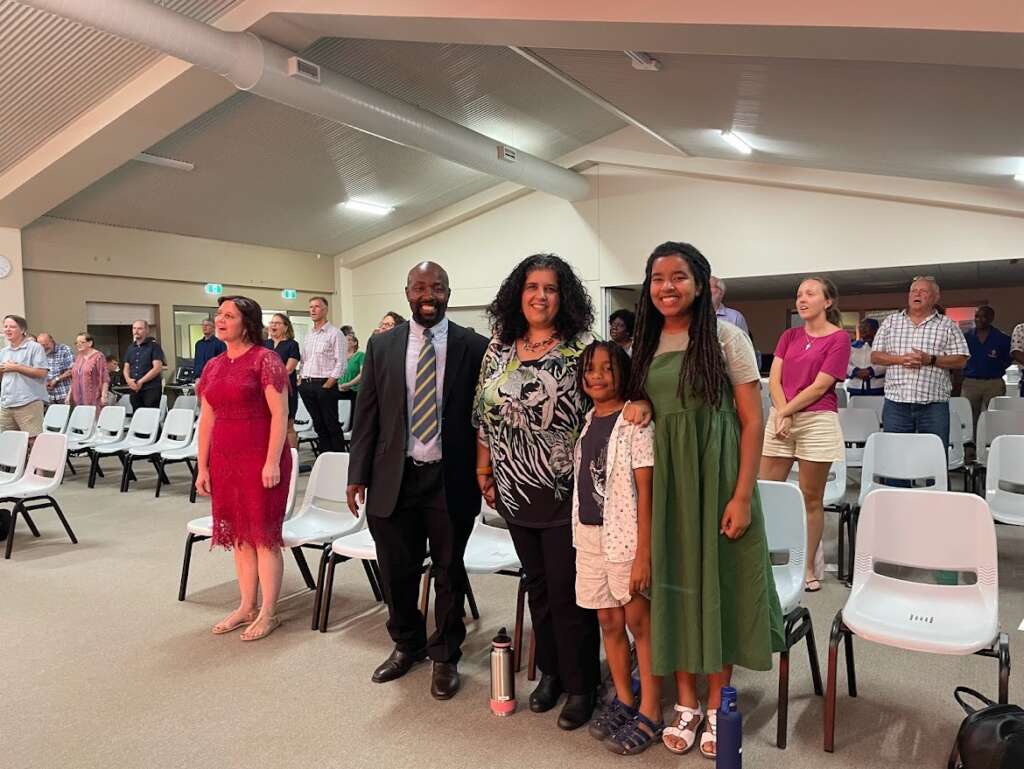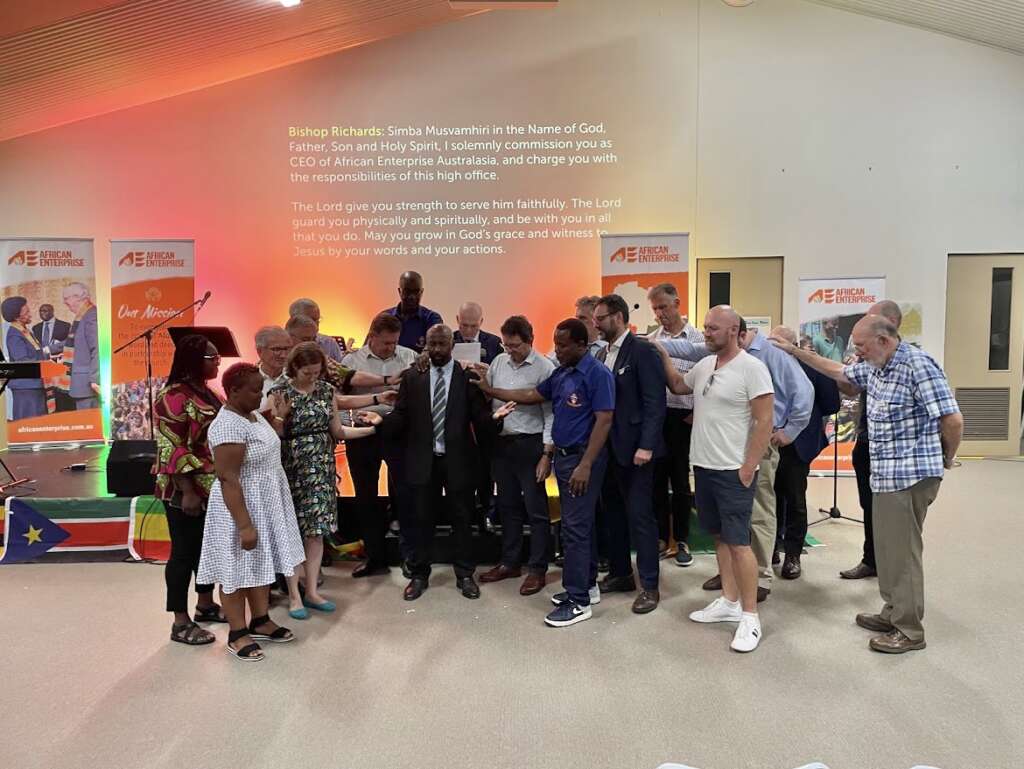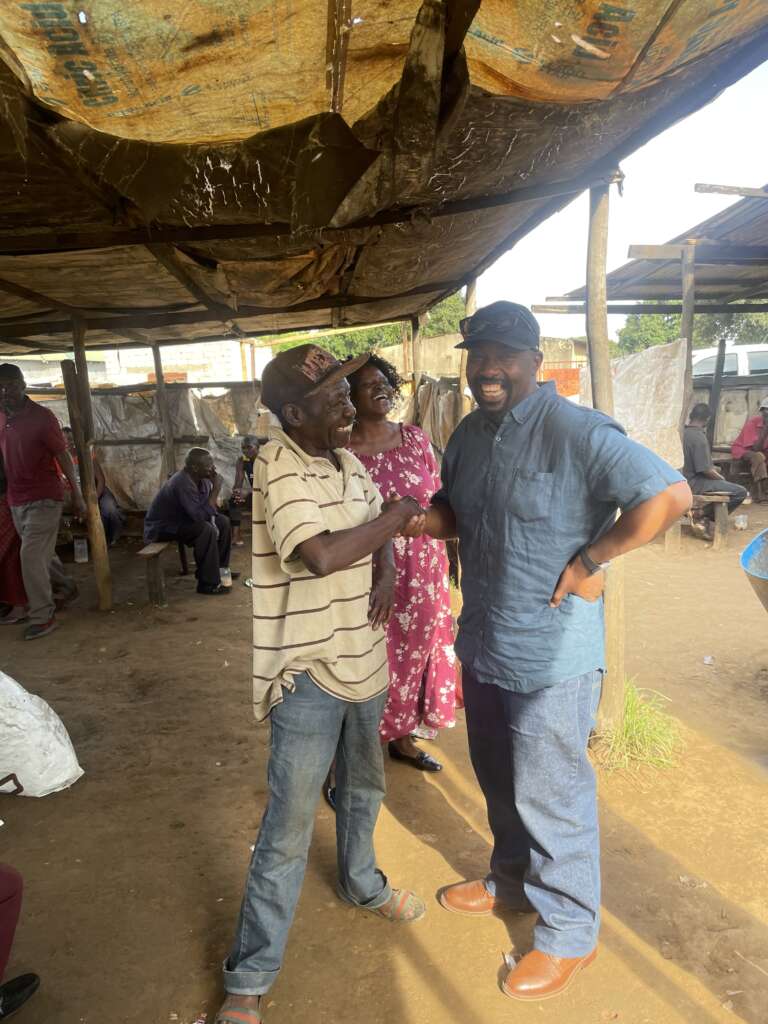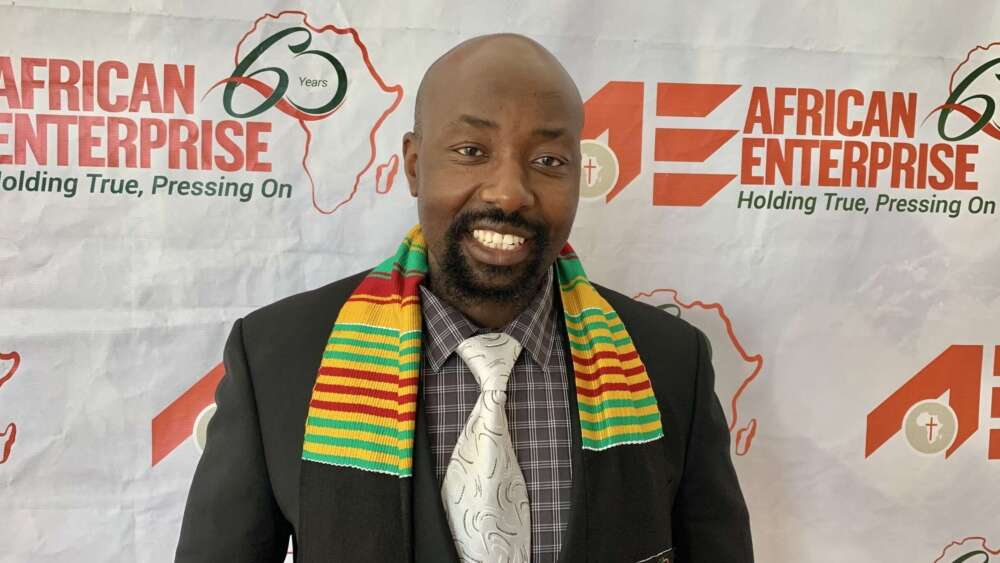From his first steps as a Christian in a revival tent in Zimbabwe to ordination in the Anglican Church of Australia, Simba Musvamhiri brings a unique heritage to his role as the new CEO of African Enterprise Australia and New Zealand.
The former Rector of the Tatura Anglican Church in country Victoria, who is married to an Australian from Perth, is proud to be an Australian citizen.
And yet, as a Zimbabwean who first joined African Enterprise’s evangelism mission work nearly 20 years ago as a new Christian, Simba is proudly African as well.
“I have the advantage of bridging two worlds,” Simba explains. “I am African one hundred per cent. I’m also Australian one hundred per cent. I have a good understanding of the vast continent of Africa, its 53 countries, distinct cultures and people groups. Despite the threats and challenges to the African church, I have seen the growth of Christianity and witnessed on many many occasions, a great response to the gospel message.

Simba Musvanhiri with his wife Helen and son Vusa, and daughter Thembi.
“I also have had the privilege of living in Australia for ten years, being immersed in the culture and doing gospel ministry in Perth, Canberra and Victoria in both urban and rural settings.”
“The question of hell and heaven was causing me not to sleep as I was fearing the unknown.”
Simba first turned to Christ in his early 20s after training as a boilermaker in Harare, putting on a good façade during the day but unable to sleep at night for fear of what might happen if he died.

Simba Musvamhiri at his commissioning service in March 2023.
“I believe God was slowly revealing himself to me, disturbing my conscience, but my pride was in the way. The question of hell and heaven was causing me not to sleep as I was fearing the unknown. Somehow, I was just afraid of the answer to that question. At that time, I had an awareness of God, but I was not a believer in Christ,” he recalls.
“So one day, I went down the street to a church that was holding what was called back then, revival meetings. These were evening meetings where the gospel was proclaimed. What drew me to those meetings was the music – I love jazz music, with trumpet, trombones and saxophones, and they were playing all that. I was like, ‘Great, four days of music, I’m going to enjoy it.’ So first day, second day, third day, nothing happened. Then the final day, which was a Friday, I remember this old African pastor preaching from Matthew 27, from verses 45 to 52.”
“It was an exposition of the suffering of Christ on the cross and he really preached Jesus dying for my sins, and it became real. I was confronted by the authority of Scripture. I was confronted by my sin. It felt like the Holy Spirit was really showing little me – a tiny sinner standing before a holy, righteous and just God. It was clear to me then that we will all stand before God on judgment day.
“Immediately, I felt convicted and walked up to the front. I turned to Christ that day and surrendered my life to him. And from that day, I had peace and no longer feared death. I remember praying with tears in my eyes, ‘I want to follow you, Jesus, and do what you say’.”

Simba Musvamhiri, right, greets Julius, who he led to the Lord during a mission in Lusaka, Zambia in February 2023.
From that moment in October 1998, Simba was on fire for Jesus, devouring and memorising the Bible and telling everyone he knew about Jesus. Yet he received great discouragement from other Christians until he joined an evangelical church in the city that nurtured his gift of evangelism and introduced him to the work of African Enterprise.
“They encouraged me to apply to African Enterprise’s youth evangelism team, which is called Foxfire Ministry. There’s hermeneutical issues here, but Foxfire is symbolically taken from Judges 15:4. It’s not a literal burning of foxes! I looked into it and thought it was a good principle for young people to be set on fire for Christ, so I joined the Foxfire team in 2005.”
As an evangelist who loves people, in his new role, Simba will continue to build on the evangelical relationships he has made through churches and his ministry in Australia. Simba is passionate about Jesus, sharing the gospel and the mission of African Enterprise. He is praying for more opportunities to speak in churches on reaching Africa.
“The Western world will be greatly impacted by Africans coming its way.”
With the World Bank forecasting that by 2050 every fourth person in the world will be African, Simba wants to talk about the urgency to reach “the youngest continent in the world.”
“The Western world will be greatly impacted by Africans coming its way. It’s going to be reverse mission. So it’s very important for us to reach this very young continent now with the gospel.”
Simba travelled to Africa at the beginning of his term as CEO in February to explore opportunities and meet the AE Teams. He has since set a fundraising target of $3 million over the next 18 months. “Covid-19 greatly impacted the sharing of the gospel, hindered gatherings and the resourcing of evangelism. Now that restrictions have lifted, our teams on the ground in Africa are excited; however, we are significantly behind in our evangelism targets and in need of finances to recommence missions.”
Simba explains that African Enterprise has four distinctives as a mission agency:
1. Evangelism of Africans by Africans in African cities. Empowering people from the grassroots through solid biblical evangelism and discipleship.
2. Gospel centrality. “The Bible is central to what we do. Jesus and the cross are central. We empower the local church in Africa to evangelise and disciple people. And we’re working with churches here in Australia and New Zealand – anyone who wants to see Africa reached for Christ.”
3. Stratified Evangelism. Reaching all levels of society with the gospel, going wherever people are. “The gospel is contextualised to reach everyone over a well-planned and prayed-up mission week – from the woman selling bananas on the street to a mechanic in the open marketplace to children at school – everyone has an opportunity to hear the gospel.” More formal settings are also organised including police and correction services forums, doctors’ dinners, business breakfasts, university student forums. “Simply put, the gospel is taken from prisoners to presidents. In Parliamentary Breakfasts organised by AE in the mission week, Presidents and elected members of parliament hear principles of how to govern the country with godliness and good governance,” Simba says. “You can only look up to the greatest leader that’s ever led, that’s Jesus Christ.”
4. Aid and development. “When we preach to people living in the big cities of Africa, we are often in the corridors of poverty. We are among the impoverished.” For example, African Enterprise has built 350 toilets and several water points in Kibera (Kenya), the biggest slum in Africa where one million people live. “So we come alongside people we’ve shared the gospel with and we say, ‘We see you. God sees you and he loves you. We love you. We personally can’t change everything, but here’s a way of showing you that we love you’. Our Aid and Development program doesn’t stand alone; it follows the sharing of the gospel.”
A crucial part of deepening the training of African ministers has been the rolling out of Moore College’s PTC – Preliminary Theological Certificate – or as they say in Africa, Pastors Training Course. “We are training 1,500 pastors across Africa right now with PTC. Some of these pastors didn’t know what the 66 books of the Bible are, yet they lead big churches.”
Many hundreds of pastors have been trained in Rwanda since 2018, when the President issued an edict that if any pastor did not have theological training, their church would be shut. “When they got their PTC certificate, they got a government diploma and were accredited to lead a church. This is exciting and encouraging; God is at work on the continent of Africa.”
www.africanenterprise.com.au
Email This Story
Why not send this to a friend?


